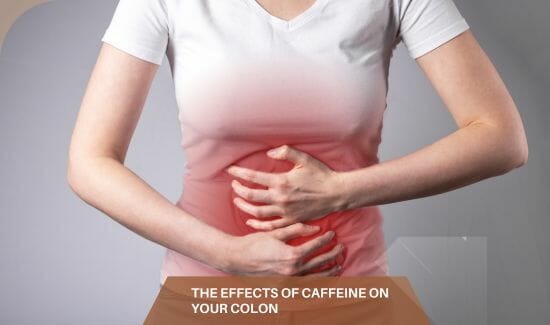
Are you tired of feeling backed up and bloated? Well, it might be time to turn to your morning pick-me-up for some relief. That’s right – we’re talking about coffee! Not only does that steaming cup of joe help kickstart your day, but it can also stimulate bowel movements and alleviate constipation. But how exactly does coffee work its magic on our digestive system?
In this blog post, we’ll dive deep into the science behind coffee’s impact on our colon, explore the role of gut hormones, examine the potential influence of dairy in coffee, and discuss the connection between coffee and that urgent need to poop.

The Effects of Caffeine on Your Colon
Have you ever wondered why that morning cup of coffee seems to have a one-way ticket straight to your bowels? Well, the answer lies in everyone’s favorite buzz-inducing compound: caffeine.
When you sip on your java, caffeine makes its way into your bloodstream and gets delivered right to your colon. Once there, it begins to work its magic by stimulating the muscles in your intestinal tract. These contractions help move things along and promote bowel movements.
But caffeine doesn’t just stop at muscle stimulation. It also has a diuretic effect, meaning it increases urine production. This can lead to increased fluid in the intestines, softening stool and making it easier for it to pass through.
Interestingly enough, research suggests that decaffeinated coffee may not have the same impact on bowel movements as regular coffee does. So if you’re looking for that extra push when nature calls, opt for a caffeinated brew.

The Role of Gut Hormones in Coffee’s Impact on Bowel Movements
Gut chemicals are a big part of the connection between coffee and making to go to the bathroom. These hormones are made by the cells that line the digestive system. They can affect the flow and other parts of digestion.
One important gut hormone involved in this process is gastrin. Gastrin stimulates the release of gastric acid, which helps break down food in the stomach. It also promotes muscle contractions in the colon, leading to increased bowel movements.
Another hormone that comes into play is cholecystokinin (CCK). CCK is released after eating and signals feelings of fullness while also stimulating bile production. Additionally, CCK has been shown to increase colonic transit time, potentially contributing to more regular bowel movements.
Furthermore, coffee consumption has been found to affect levels of peptide YY (PYY), which is responsible for reducing appetite. PYY may also have an impact on bowel movements by regulating colonic motility.

The Potential Influence of Dairy in Coffee on Digestive Health
For many people, a cup of coffee is incomplete without a splash of milk or cream. But have you ever wondered how adding dairy to your daily brew might impact your digestive health? Let’s explore the potential influence of dairy in coffee on your gut.
It’s important to note that not everyone reacts the same way to dairy. Some individuals may be lactose intolerant and experience digestive discomfort or bloating after consuming milk-based products. If you suspect that you have lactose intolerance, it may be best to avoid adding dairy to your coffee altogether.
However, if you are not lactose intolerant, the effects of adding dairy to coffee can vary from person to person. Some studies suggest that calcium-rich foods like milk can promote regular bowel movements and alleviate constipation. Calcium acts as a natural laxative by stimulating muscle contractions in the colon, helping waste move through more efficiently.
If you like putting cheese in your coffee and don’t feel bad afterward, there’s no reason to stop. But if you regularly use this mix and have bad reactions to it, you might want to try other things like non-dairy creamers or plant-based milk like almond or oat milk.

Exploring the Connection Between Coffee and the Urge to Poop
Have you ever noticed that after enjoying a cup of coffee, you suddenly feel the urge to visit the restroom? You’re not alone! Many people experience this phenomenon, and it’s not just a coincidence. There is actually a scientific explanation behind the connection between coffee consumption and bowel movements.
One possible reason for this effect is caffeine. Caffeine acts as a natural stimulant, which means it can increase activity in your digestive system. When you consume coffee, caffeine travels through your bloodstream to your colon, where it triggers contractions in the muscles lining your intestinal walls. These contractions help move waste through your digestive tract more quickly, leading to that familiar urge to poop.
Another factor that may contribute to coffee’s impact on bowel movements is its acidity. Coffee contains acids that can stimulate the production of stomach acid and increase gastric emptying time. This means that after drinking coffee, food moves more rapidly from your stomach into your small intestine, potentially speeding up digestion and promoting regular bowel movements.
Additionally, some experts believe that certain substances found in coffee may have laxative properties. For example, compounds called chlorogenic acids could have an effect on gut motility by increasing water content in stools or softening them.

The Impact of Coffee Timing on Bowel Movements
The timing of your coffee consumption can play a significant role in its impact on bowel movements. For many people, enjoying a cup of coffee in the morning serves as a gentle wake-up call for their digestive system. The caffeine content stimulates the muscles in the colon, promoting contractions and ultimately leading to an urge to have a bowel movement.
Additionally, factors such as individual metabolism and sensitivity to caffeine can influence how quickly coffee affects one’s bowels. It’s crucial to pay attention to your body’s unique response and adjust your coffee routine accordingly.
Furthermore, consider other elements that could be impacting your digestive system alongside coffee consumption. Are you eating breakfast along with your morning brew? What types of food do you typically consume throughout the day? These factors can also contribute to overall bowel regularity.

Using Coffee to Alleviate Constipation: Tips and Considerations
Using coffee as a natural remedy for constipation has been a popular practice for many years. If you’re considering giving it a try, here are some tips and considerations to keep in mind.
Moderation is key when using coffee to alleviate constipation. While it can be effective in stimulating bowel movements, consuming excessive amounts of caffeine can lead to negative side effects such as increased heart rate and jitters. It’s best to start with a small cup of coffee and see how your body responds.
Additionally, timing is important when using coffee for constipation relief. Drinking a cup of coffee first thing in the morning may help kickstart your digestive system and promote regular bowel movements throughout the day. However, be mindful that caffeine can also have diuretic effects, so make sure to stay hydrated by drinking plenty of water alongside your coffee.
Furthermore, consider pairing your coffee consumption with other dietary changes that support healthy digestion. Gradually increasing fiber intake from fruits, vegetables, whole grains, and legumes can complement the impact of coffee on bowel movements. Staying physically active and maintaining good hydration levels are also essential factors to consider.

Coffee Enemas: Exploring Potential Benefits and Risks
Coffee enemas have garnered attention as a potential solution for constipation, claiming to detoxify the body, enhance digestion, and alleviate constipation. However, it’s crucial to approach this practice with caution due to the limited scientific backing and potential risks involved.
Potential Benefits:
People who like coffee enemas say that they can help with digestion, relieve constipation, and clean out the body. Some people even say that the process gave them more energy and helped them think more clearly. These claims are based on the idea that the caffeine and other chemicals in coffee stimulate the stomach, causing bowel movements and possibly making it easier to get rid of waste.
Possible Risks:
There are risks that you shouldn’t ignore if you use coffee enemas. One big worry is that the intestines could become inflamed or hurt if they are repeatedly exposed to hot beverages in the wrong way. Reports also say that using coffee enemas too much can cause electrolyte issues and make you feel thirsty.
Dependency and Over-reliance:
Depending solely on coffee enemas for regular bowel movements might foster dependency on the practice, hindering the adoption of healthier, evidence-based approaches to managing constipation. Prioritizing dietary adjustments, hydration, exercise, and other proven methods should be the primary course of action.

As a dedicated blogger, I share insights, tips, and knowledge on all things caffeinated and beyond. I firmly believe that a well-brewed cup of coffee or a skillfully crafted cocktail has the power to unite people and ignite engaging conversations.


